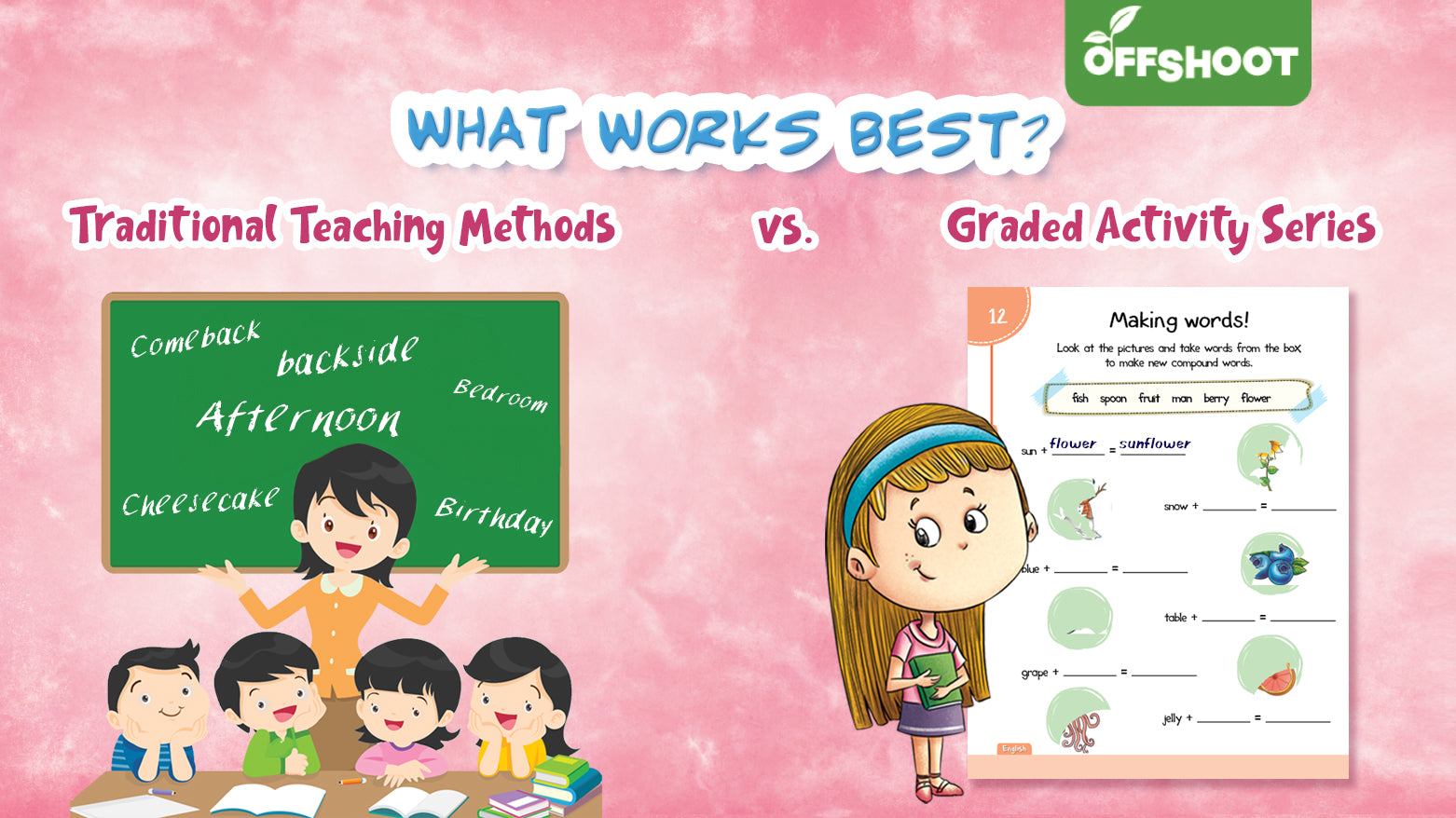
Comparing Traditional Teaching Methods vs. Graded Activity Series: What Works Best?
| Offshoot Books
Teaching is how we pass knowledge from one generation to the next. Over time, teaching has changed a lot. Today, many people compare traditional teaching methods with graded activity series to see which works better. Let’s explore both to find out what helps children learn the most.
What are Traditional Teaching Methods?
Traditional teaching methods are the old ways of teaching. They often focus on the teacher talking and the students listening. This is also called classroom teaching. Teachers explain lessons, write on the board and give tests.
In these methods, students usually learn by reading books and memorising facts. This is great for teaching important information quickly. Many schools still use this way of teaching because it’s simple and easy to follow.
What is Graded Activity-Based Learning?
Graded activity-based learning is a modern way of teaching. It uses fun tasks, puzzles and experiments to teach. This method focuses on children doing activities instead of just listening. Activity-based learning makes lessons fun and helps children understand better by practising what they learn.
A good example of this is the “Smart Smarter Smartest” series by Offshoot Books. These books are designed for different age groups:
This series is perfect for combining learning with fun. It teaches subjects like Mathematics, Science and English while helping kids think and learn.
Key Differences Between the Two Methods
Here are some main differences between traditional teaching methods and graded activity-based learning:
How Lessons are Taught
In classroom teaching, the focus is on lectures and textbooks. In contrast, graded activity series use hands-on tasks and experiments to teach concepts.
Engagement Level
Children sometimes may feel disinterested in traditional teaching methods because they only listen or read. But with activity-based learning, they enjoy lessons through puzzles, games and creative tasks.
Learning Speed
Classroom teaching helps students cover many topics quickly. However, graded activity-based learning focuses on understanding topics deeply, even if it takes more time.
Application of Knowledge
Traditional teaching methods teach facts. The “Smart Smarter Smartest” books teach children how to apply their learning. For example, kids can do experiments or write stories to use what they have learnt.
Development of Skills
Memorising facts is the main goal in classroom teaching. In graded activity-based learning, children develop cognitive skills. These include problem-solving, critical thinking and creativity.
How Do Offshoot’s “Smart Smarter Smartest” Books Help?
The “Smart Smarter Smartest” series is designed to make learning fun and effective. Each book in the series builds on what children already know and helps them improve step by step. Here’s how it helps children in different age groups:
Ages 5-6
What makes learning fun? The idea that we end up learning without being asked to learn! This book will do just that and more. The children will be busy doing fun activities without realizing that they are revising all the concepts that have been taught in class. It’s an ideal workbook for children of this age.

Ages 7-8

Ages 9-10

Which Method Works Best?
Graded activity-based learning works well for children who need more hands-on experience. It helps them learn at their own pace and in a fun way. The “Smart Smarter Smartest” books are a great example of this method. They combine lessons with enjoyable activities, ensuring children understand and apply what they learn.
Why Combine Both Methods?
- Classroom teaching can introduce basic concepts.
- Graded activity series like “Smart Smarter Smartest” can deepen the learning with practical activities.
- This mix allows children to learn facts and also develop important skills. Schools and parents can use these books to make learning both traditional and fun.
Takeaway
By using Offshoot’s “Smart Smarter Smartest” books, parents and teachers can ensure children learn in a way that’s both fun and effective. These books not only teach but also help kids develop their cognitive abilities. So, why not give them a try and see the difference they make in your child’s learning journey?

Leave a comment
Your email address will not be published.